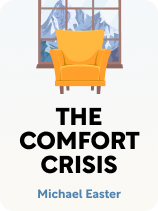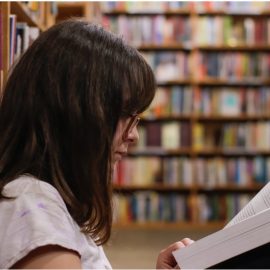

This article is an excerpt from the Shortform book guide to "The Comfort Crisis" by Michael Easter. Shortform has the world's best summaries and analyses of books you should be reading.
Like this article? Sign up for a free trial here.
Are the comforts of modern life keeping you from living up to your full potential? How might you embrace discomfort and grow as a result?
Michael Easter’s The Comfort Crisis argues that the abundance of comforts we live with in the modern, Western world counterintuitively hurts our health and happiness. He urges us to get back to our roots, embrace primitive discomforts, and improve our well-being by doing so.
Continue reading for an overview of this book that encourages you to get out of your “comfortable” zone.
Overview of The Comfort Crisis
Michael Easter’s The Comfort Crisis (2021) contends that our easy access to comfort removes many challenges that our ancestors benefitted from, such as exercising to earn our food, enduring hunger, and spending time out in nature with nothing but our thoughts. To combat the negative effects of over-comfort that we’re dealing with today, Easter proposes that we welcome discomfort back into our lives by adopting habits that align with our evolutionary design, such as performing functional exercises, fasting, embracing boredom, and prioritizing time outdoors.
Michael Easter is an author, science journalist, and professor at the University of Nevada. After he personally experienced the benefits of discomfort during his journey to sobriety, Easter began researching how embracing discomfort in other areas of his life could enhance his health and happiness. He discovered that reintroducing physical and mental challenges into our everyday lives can counteract the dulling effects that modern-day comforts have on our well-being. After The Comfort Crisis, Easter wrote Scarcity Brain (2023), which explains how to overcome our evolutionary instinct to always crave more.
We’ll discuss Easter’s research on the most harmful comforts and share his advice on how to counter each by welcoming discomfort into our lives.
How We Became Too Comfortable Over Time
Easter explains that our drive for comfort began with fulfilling our basic survival needs: quelling our hunger, finding warmth, and so on. But, while our ancestors faced incredible challenges in the pursuit of comfort for most of human history (for example, regularly traveling many miles to hunt or forage), our everyday comforts have become increasingly easy to obtain in the last century. We now live and work in climate-controlled buildings, we’re surrounded by an abundance of calorie-dense foods, and we have smartphones that can satisfy many of our desires with a simple call or click.
With so many of our needs easily met, our survival no longer depends on many of the discomforts that have naturally contributed to our health and happiness for the vast majority of human history, such as spending most of our time in nature, taking on physical challenges, enduring hunger, and regularly facing the reality of our mortality. As a result, Easter says we now increasingly suffer from chronic physical and mental health issues. For example, chronic diseases like diabetes, obesity, heart disease, depression, and anxiety were essentially nonexistent and extremely rare until about a century ago.
To reclaim the benefits of our uncomfortable past, Easter doesn’t suggest removing yourself from modern civilization in favor of a fully feral existence. He recognizes that modern advancements relieve us from many forms of suffering that ancient humans had to grapple with—starvation, animal predation, and infection, to name a few. However, our easy access to comforts has also had unforeseen consequences for our health and happiness, and Easter explains how and why we should reintroduce some healthy discomforts into our lives to counter these effects.
| Is Our Comfort Crisis the Result of an Evolutionary Mismatch? The incompatibility of our ancient instinct for seeking comfort and our modern maladies caused by comfort is what some experts would call an evolutionary mismatch. This is when biological traits that were once well-suited for survival are no longer advantageous because of rapid changes in our environment. In other words, the rapid development of modern life hasn’t allowed enough time for our biology to catch up. As a result, our hunter-gatherer bodies are mismatched with this new environment in many ways. Besides our instinct for comfort, another example of an evolutionary mismatch is our fight-or-flight response. In the past, this surge of energy from adrenaline regularly helped us fight or flee from danger, but fighting and running aren’t always appropriate responses to our modern stresses, such as a test at school or a work presentation. In addition to not being very helpful, chronic fight-or-flight responses can even lead to a variety of health issues. |
Urban Life Costs Us Nature’s Benefits
Although modern cities offer us many benefits, urban environments have also removed us from the discomforts of the natural world that we belong to, and this has a variety of harmful consequences. To unpack this problem, we’ll explain Easter’s research on the harmful effects of city living and examine the benefits of getting back to nature.
The Negative Effects of Urban Life
According to Easter, our pull to the city is a natural result of our evolutionary instincts to live in an environment that’s rich with survival resources and mating opportunities. However, urban comforts remove us from the natural environment we evolved in. This causes a swath of health issues and deprives us of many psychological and physical benefits. Easter references research showing that people living in cities are 21% more likely to suffer from anxiety and 39% more likely to have depression than people living in rural areas.
Easter says high population density and noise contribute to chronic mental health issues and unhappiness. He references research showing that, for most of human history, our ancestors lived in groups of about 150 people or fewer. This is called Dunbar’s number, after the anthropologist Robin Dunbar who discovered this population sweet spot. According to him, a group of 150 people is big enough to adequately protect itself, gather resources, and share. However, when communities exceed this number, it becomes difficult to maintain close relationships and cooperate. Anthropologists argue that, even today, our brains are programmed to prefer a lower population density, and when we’re surrounded by unfamiliar faces in urban environments, this stresses us out.
Along with population density, city soundscapes cause us stress, which can lead to a variety of illnesses, such as depression and heart problems. Easter explains that this is because humans evolved in natural environments that were relatively quiet most of the time. Any loud noises in nature typically indicate danger. So, we register the constant commotion of cities as threatening, which translates to chronic stress reactions that have several damaging effects on our well-being.
Comfort Remedy: Get Out in Nature
Spending time outside counters the costly comforts of city living. According to Easter, after only 15 minutes in nature, feelings of anxiety, depression, and anger are reduced.
Here are a few of Easter’s tips to spend quality time in nature on a weekly, monthly, and yearly basis:
- Every week, take at least three nature breaks for 20 minutes or more, even if it’s just in a city park. This significantly reduces stress, as well as makes you more productive and creative at work.
- Every month, spend at least five hours in “rural” nature. This means getting out of the city and into the countryside.
- Every year, take at least one three-day trip in “wild” nature. For Easter, wild nature means there’s no sign of civilization in sight and you have little to no cell phone reception. He references research that shows three-day trips alter our brain waves by the third day from beta waves to alpha and theta waves. Beta waves are your focused, nervous waves that reflect busy, stressed feelings. Alpha and theta waves are associated with relaxation, flow, and an overall boosted mood.
Fear Squashes Our Call to Adventure
Another way comfort holds us back is by making us hesitant to challenge ourselves and discover our full potential. Because of this, many of us don’t feel tested, which is linked to psychological issues such as anxiety and depression. On top of that, when we don’t push our limits, we never discover our full potential. We’ll break down this issue by explaining why we rarely dare to step out of our comfort zones and the negative effects this has. To remedy this problem, we’ll explain how embracing challenges helps you feel happy, confident, and more resilient.
Why We’re Hesitant to Push Our Limits
Easter explains that we limit ourselves with restrictive comfort zones because we evolved to have a disproportionate fear of failure. For most of human history, failure often meant death. However, today’s failures rarely have serious consequences. Therefore, Easter argues that our fear of failure isn’t as applicable to our modern circumstances, and it instead limits us from doing things that can make our life more meaningful.
How Pushing Our Limits Helps Us Feel Happy and Grow
Easter says that we all crave to be challenged and transformed. Challenges that test our physical and mental capacity help us feel happy, confident, and more resilient.
When you push yourself beyond your perceived limits, you give yourself a boost in confidence because you prove to yourself that you can go further than you previously thought. In this way, any future challenges seem more conquerable. Furthermore, people with a history of struggle demonstrate more resilience when faced with new challenges. Easter cites one study that tested the pain tolerance of participants by having them hold their hands in ice water. The study found that participants who had experienced some hardship in life found the pain more tolerable than participants that experienced no hardship.
Comfort Remedy: Go on a Challenging Adventure
Here are Easter’s tips to embark on a transformational challenge:
- Make sure your challenge is difficult but not deadly. This means doing something that you have roughly a 50% chance of accomplishing. If you fail, that’s okay. Your goal should be to push yourself, not to cross a finish line. Just make sure that the consequence of failing isn’t death.
- Make your adventure unique to you. Design your challenge so that it’s challenging for you at your level of capability, not anyone else’s. By making your challenge unique to yourself, it’ll help make the experience about personal growth and prevent the temptation to compare yourself to other people, which is ultimately unsatisfying.
- Don’t share your challenging adventure on social media. Easter says that sharing your challenge on social media can make the challenge about obtaining attention rather than personal perseverance.
Sedentary Lifestyles Lead to Physical Weakness and Injury
In this section, we’ll discuss the negative effects of sedentary lifestyles and how to get your body moving the way it’s meant to. We’ll explain how low-activity lifestyles cause problems such as back pain. After that, we’ll examine the benefits of exercising and provide some context about the types of movement humans evolved to perform.
Modern Life Doesn’t Get Us Moving Enough
Our exercise levels have progressively decreased as innovations such as farming, industrialization, and digital technology have made movement increasingly obsolete for our survival. Easter says that three-quarters of American jobs today involve sitting for most of the day. Further, only 20% of Americans meet the national guidelines for exercise (150 minutes per week) and 27% percent of Americans don’t get any exercise. When we don’t use our muscles, they become weaker and more susceptible to injury.
According to Easter, one of the most significant consequences of our sedentary lifestyles is back pain. 80% of Americans suffer from back pain at some point in their life. This is the most common type of pain that people visit doctors for and it’s the number one reason people miss work. Back pain medication is also a leading cause of opioid addiction.
Comfort Remedy: Exercise Like Your Ancestors
Exercise prevents back pain and significantly reduces your chances of all major causes of death in the US, including heart disease and cancer. This is because your body evolved to move. To demonstrate the lifestyle of our ancestors, Easter points to the modern-day Hadza tribe of Northern Tanzania, who live similarly to ancestral hunter-gatherers. According to him, the people of this tribe move 14 times more than modern Americans and burn an average of 40% more calories per pound each day. Easter says the athletic stamina of ancestral hunter-gatherers equaled that of modern, elite, college-level cross-country runners. These ancestors weren’t gifted with unique athletic abilities. They had the same bodies we have, but they were living in an environment with different demands.
Easter goes on to explain that we’re built to run long distances and carry objects more efficiently than any other animal on Earth. Our running capabilities developed to help us “endurance hunt,” which essentially means we’d persistently jog down our prey in hot conditions until it collapsed from heat exhaustion. We’re not stronger or faster than most mammals, but we can outlast them all in a long-distance chase. We have several physical features that help keep us cool and run long distances in the heat, such as our ability to produce more sweat than other animals and the bouncy arches in our feet.
More often than they ran, our ancestors carried things. Our hunter-gatherer ancestors mostly hauled around tools and animal parts weighing between 10 and 20 pounds, which we in the modern world could probably carry for a few miles. But, our ancestors also sometimes carried heavier loads such as large animal parts from a hunted and butchered carcass.
To exercise in a way that compliments our natural strengths, Easter suggests rucking. Rucking is the act of carrying a heavy pack on your back for long distances. It offers a wide variety of benefits including the promotion of overall fitness.
Comfortable Diets Are Deadly
Another consequence of our modern lifestyles is obesity. In this section, we’ll focus on the harmful effects that comfortable diets have on our health and how enduring the discomfort of hunger can help us counteract modern eating habits.
The Obesity Epidemic
Obesity is an epidemic in the United States. Easter says 38% of the US population is obese and 32% is overweight. This is a big problem because obesity is a major risk factor for conditions like heart disease, cancer, and type 2 diabetes. In fact, obesity decreases your lifespan by an average of 5 to 20 years.
Easter explains that our evolutionary instincts make us dangerously susceptible to obesity in modern America. This is because humans evolved to take advantage of opportunities to gorge on food and stockpile calories whenever it was possible. Hunting and gathering weren’t as surefire for producing food as our trips to the grocery store today, so it was important for ancient humans to capitalize on calories whenever they were available to build fat reserves as insurance for the uncertain future. The problem is, we’re now constantly surrounded by food, but we’re still programmed with the same evolutionary instinct to gorge.
On top of this, many of the processed foods available today are specially designed to be calorie dense and more delicious than anything found in nature. Our brains are wired to release dopamine—the feel-good chemical—when we consume anything sugary, salty, or fatty because these tastes indicate that the food we’re eating is calorie-dense. Today, foods such as pizza and ice cream present an unnatural, carb-fat combination that releases more dopamine than anything we can pluck off a tree, which amplifies our cravings.
Another major cause of obesity is stress eating. As we discussed earlier, chronic stress is increasing in the developed world, and eating comfort foods to cope with it is a recipe for disaster. Easter cites one study that found that 40% of people overeat when they’re stressed and the quality of food consumed during stress eating tends to be poor. We reach for junk food when we’re stressed because it quickly releases dopamine, which improves our mood and gives us temporary relief from chronic stress. This is why we might feel tempted to overeat at lunch if we’re having a stressful day at work.
Comfort Remedy: Endure the Discomfort of Hunger
Fasting is a natural human behavior and can help curb obesity. While it’s currently common to snack throughout our day, ancient humans endured hunger most of the time and only ate one or two large meals per day.
Easter says fasting makes us healthier in several ways:
- Your body will begin to use your fat cells for energy.
- By burning these cells off, you prevent diseases and infections.
- Fasting also gives you a surge of energy.
Here are a few of Easter’s tips to fast effectively:
- Skip breakfast.
- Schedule an occasional full-day fast.
- When you feel stressed, don’t eat—exercise.
Internal Comforts Distract Us From What Matters Most
The comforts we live with today don’t just impact our bodies, they influence our minds as well. With so many distractions, it’s easy to numb our minds and avoid thinking about things that are uncomfortable to confront. However, Easter says letting your mind go to uncomfortable places is important for creativity, productivity, and happiness. In this section, we’ll discuss how materialism distracts us from boredom and thinking about death as well as the benefits these internal discomforts can offer.
The Comforts of Materialism Eliminate the Benefits of Boredom
Modern technology impedes boredom by tempting our attention whenever our mind starts to drift to uncomfortable territory. On average, we spend 11.6 hours with digital media each day. This includes time on our phones, in front of TVs, and on our computers. When we’re focused on social media and entertainment, we don’t have time for boredom.
Easter defines boredom as a state of unfocused mental rest and openness. Boredom is important for our mental health because it allows our minds to decompress. However, because the constant stream of virtual stimulation available today has our attention in a stranglehold, we rarely allow ourselves a chance to rest our minds. As a result, we burn out our brains. When our brains tire from too much time engaging with digital media, we feel more irritable, impatient, and upset. This can also lead to anxiety and depression, and it can lower our sense of meaning in life.
Materialism Distracts Us From Our Mortality
Materialism not only distracts us from boredom, but it also keeps us from deeply considering big-picture questions, such as death. In modern Western society, we typically hide from death because it’s uncomfortable to think about. 80% of Westerners feel uncomfortable with the idea of death and only half of people over the age of 65 have considered how they’d like to die.
Instead of recognizing the reality of our mortality, Easter explains that Westerners are commonly lost in the illusion of our permanence. When consulting a Bhutanese monk about this issue, the monk told Easter that our illusion of permanence causes us to distract ourselves with material pleasures and put off thinking about death.
Comfort Remedy: Embrace the Discomfort of Boredom
Boredom improves our creativity and motivates us to become more productive. One study found that participants who performed boring activities (such as reading a phone book for 15 minutes) demonstrated much stronger creativity than participants who didn’t endure a boring activity. This is because boredom puts your mind into an unfocused state that allows you to be open to more ideas.
The discomfort of boredom can also spur you to get stuff done. Until recently, humans didn’t have distractions like phones to numb our brains at the first inkling of discomfort. So, we’d have to find other ways to channel our boredom, such as improving a shelter or finding a more productive way to catch food.
Bonus Remedy: Reconcile With the Reality of Death
By considering death, you’ll feel more happy, free, compassionate, and grateful. Easter says one study found that people on their deathbeds felt more satisfied with their lives when they were asked to regularly discuss their death during the days before they died. Realizing that death can come at any moment orients you with whatever matters most to you. Finally, thinking about death helps you realize how precious your life is.

———End of Preview———
Like what you just read? Read the rest of the world's best book summary and analysis of Michael Easter's "The Comfort Crisis" at Shortform.
Here's what you'll find in our full The Comfort Crisis summary:
- Why a modern, comfortable lifestyle is bad for health and happiness
- Why discomforts such as being in nature, fasting, and exercising are important
- Tips on how to make discomfort your friend






